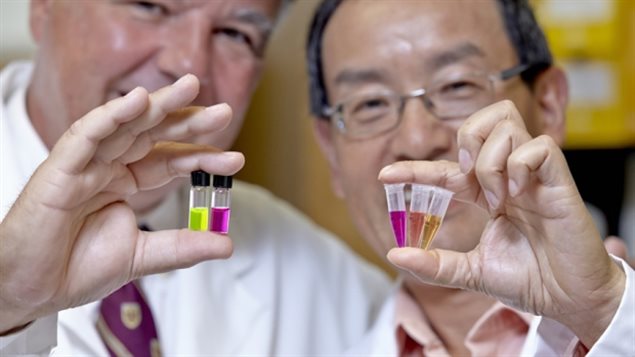Two researchers at McMaster University in Hamilton, Ontario, are working on what may become a lifesaver.
It involves glowing poop, and colon cancer.
Colorectal cancer is the second leading cause of cancer deaths for men in Canada, behind lung cancer, and the third-leading cause of death among women, behind lung and breast cancer, according to Canadian Cancer Statistics 2014.
But, if detected early enough, colorectal cancer is 90 percent treatable.
Dr Yingfu Li is a biochemist, and Dr Bruno Salena is a gastroenterologist.
While on a golf course, they began chatting about their different areas of research and knowledge and realized that working together they may come up with a far simpler, easier, and less expensive test for colon cancer.
If it works with colon cancer, it could be applied to other cancers
Dr Li explained how he is in the midst of developing a test for Clostridium difficile (C-difricile) bacteria using DNA enzymes and the two men realized a similar process could be developed in relation to a disease such as colon cancer.
Their idea is simple and could be performed in doctor’s office with quick results. Patients provide a stool sample, which would be mixed with a “fluorescent signal” DNA enzyme (DNAzyme). If any cancer is present, the sample would glow.
Dr. Salena is quoted as saying, “If the test works, there’s no reason the same system couldn’t be implemented to test other types of cancer, like using a glowing urine sample to find prostate cancer.”
Currently the most accurate method of testing for this cancer is a colonoscopy. This involves insertion of a thin flexible tube with a camera and a tool to take a biopsy if necessary, It is an involved process; invasive, uncomfortable, expensive, and usually recommended only for those over age 50. There are simpler tests called fecal occult blood tests but these are known to provide a certain percentage of both false negatives and false positives
Dr Li says that such partnerships between the scientific fields and medical fields are the foundation for breakthroughs in treatments. He is quoted as saying, “”I have a PhD but not a medical degree. There is a huge gap for really getting together and creating ideas with a common interest,” he said. “I’m not only very grateful (for the opportunity), but also excited.”
Thanks to a $200,000 grant from the Canadian Cancer Society they are currently collecting a vast library of some quadrillion DNA sequences looking for ones that will react with cancer cells in faeces, but remain muted in “normal” stool samples They have collected stool samples from some 30 colorectal cancer patients and hope to have a suite of enymes to test with them.







For reasons beyond our control, and for an undetermined period of time, our comment section is now closed. However, our social networks remain open to your contributions.